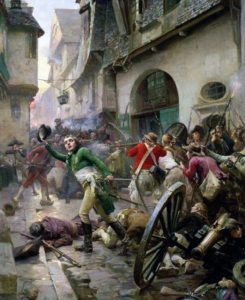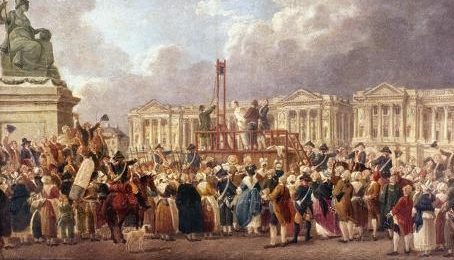Who were these unfortunate people? What horrible crimes did they commit that warranted such a death sentence? Why should we care? Because they lived and died, and then were forgotten.
The terror and subsequent making of a new Republic of France, saw executions and deaths from nobles to peasants, from Church Bishops to the lowest of clergy, military officers down to military surgeons and soldiers, men, women and children were not spared.’

The French Revolution was a horrific time filled with madness, mutilations, massacres, murder, and mass executions that took place between 1792-1796. According to the online encyclopedia Britannica, that time of hysteria saw 300,000 arrested, about 17,000 were recorded to have been executed, and roughly 10,000 died in prison or without trial . The number of deaths documented in the The incidence of the terror during the French Revolution: a statistical interpretation‘ 1 estimates the deaths to be much higher
Not all of the condemned were executed by the guillotine. Drownings, hangings, shootings, stabbings and other heinous acts of killing people also occurred. Mass executions and massacres were daily occurrences. Most notable were conducted in Nantes , Paris, Lyon, and more. Even then, the French Revolution and it’s destruction was conducted in all departments across France.
What a horrible chapter of the French Revolution! It came complete with hysteria and carnage. We know about the notable people and their lives of the French Revolution, but what about the other garden variety of victims? Should they be set aside? What were their names? How can I find out about them?

Here we find the answers of the names and details of the executed from “DICTIONNAIRE DES INDIVIDUS ENVOYÉS A LA MORT JUDICIAIREMENT” 1792-1796 (the whole title is longer than this) recorded and penned by French historian and journalist Louis-Marie Prudhomme provides this information. The two volumes online books contain the names, places of birth, residence and trial, age, some biographical info, and charges the accused were said to have committed. A lot of exciting events; description of the crimes, conspiracies, assassination attempts, as well to breakers of the law, counter-revolutionists, trivial crimes, such as hiding a priest or charges of passing ‘fake money”. Unfortunately, these dictionaries are all in French. You will need an online translator and encyclopedia. You can highlight and paste the form information into an online translator to give you understanding of what happened. You will also need to use an online encyclopedia to understand some of the phrasing and background history of the events, crimes they are accused of ex: ‘malheureuses journées’ Need to know what the French Occupations were? FamilySearch provides this tool
